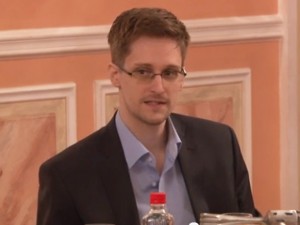This piece was reprinted by OpEdNews with permission or license. It may not be reproduced in any form without permission or license from the source.
Source: Consortium NewsNSA whistleblower Edward Snowden speaking in Moscow on Oct. 9, 2013, after receiving an award from an organization of former U.S. intelligence officials. (From a video posted by WikiLeaks)
I've had a couple of days to reflect after arriving back from Moscow where my whistleblower colleagues Coleen Rowley, Jesselyn Radack, Tom Drake and I formally presented former National Security Agency contractor Edward Snowden with the annual Sam Adams Associates award for integrity in intelligence.
The thought that companioned me the entire time was the constant admonition of my Irish grandmother: "Show me your company, and I'll tell you who you are!" I cannot remember ever feeling so honored as I did by the company I kept over the past week.
That includes, of course, Snowden himself, WikiLeaks journalist Sarah Harrison (and "remotely" Julian Assange) who, together with Russian civil rights lawyer Anatoly Kucherena, helped arrange the visit, and -- last but not least -- the 3,000 Internet transparency/privacy activists at OHM2013 near Amsterdam, whom Tom, Jesselyn, Coleen and I addressed in early August and who decided to crowd-source our travel. (See: "In the Whistleblower Chalet" by Silkie Carlo).
As representatives of Sam Adams Associates for Integrity in Intelligence, we were in Moscow last Wednesday not only to honor Snowden with the award for integrity, but also to remind him (and ourselves) that we all stand on the shoulders of patriots who have gone before and pointed the way.
Because of speaking commitments he could not break, Pentagon Papers truth-teller Dan Ellsberg, whom Henry Kissinger called "the most dangerous man in America" and who in 1971 was vilified as acidly as Ed Snowden is being vilified now, could be with us only in spirit. He did send along with us for Ed the video of the award-winning documentary that uses Kissinger's epithet as its title, together with Dan's book, Secrets, in which he had inscribed a very thoughtful note.
Ellsberg's note thanked Snowden for his adroit -- and already partially successful -- attempt to thwart what Snowden has called "turnkey tyranny," that is the terrifying prospect of a surveillance-driven government tyranny ready to go with the simple turn of a key.
Two at our table -- Ed Snowden and Tom Drake -- enjoy with Dan the dubious distinction of having been charged with espionage under the draconian Espionage Act of 1917 that is so much favored by the administration of President Barack Obama and other zealous protectors of the national security state and its multitude of secrets.
Call me naive, but I had no sense that I was cavorting with treasonous criminals. Rather, it seemed crystal clear that Ed Snowden is simply the current embodiment of people so castigated when they feel compelled to speak out, as Ed did, against gross violations of the Fourth Amendment.
Compelled? Well, yes, compelled. Those of us like Snowden, who took a solemn oath "to support and defend the Constitution of the United States against all enemies foreign and domestic," recognize that our oath has no "expiration date."
During interviews, I found it easy to put the Snowden disclosures into perspective regarding the seriousness of the Bush and Obama administration crimes against the Fourth Amendment by simply reciting that key part of our now-fractured Bill of Rights; it's just one sentence:
"The right of the people to be secure in their persons, houses, papers, and effects, against unreasonable searches and seizures, shall not be violated, and no Warrants shall issue, but upon probable cause, supported by Oath or affirmation, and particularly describing the place to be searched, and the persons or things to be seized."
Director of National Intelligence James Clapper may be able to tell Congress with impunity (in his own words) "clearly erroneous" things, but neither he, nor his duplicitous sidekick NSA Director Keith Alexander, nor complicit Senators and Representatives, nor the President himself can easily bend the Fourth Amendment that far out of shape once people read the text.
And that, of course, explains why co-conspirators in Congress like House Speaker John Boehner and Senate Intelligence Committee chair Dianne Feinstein call the kettle black by branding Snowden a "traitor." And it is also why former NSA and CIA director Michael Hayden and House Intelligence Committee chair Mike Rogers indicate publicly, as they did two weeks ago, that they would like to see Snowden's name added to the infamous "Kill List" for the President's approval.
That list renders the Fifth Amendment "quaint and obsolete," the words used by George W. Bush's White House counsel Alberto Gonzales when troublesome legal restrictions might otherwise impinge on what the White House wished to do.
American Traditions
At our dinner with Ed Snowden, Coleen Rowley reminded him that his willingness to expose injustice fit in with a patriotic tradition modeled by Founders like Benjamin Franklin even before the American Revolution.
Coleen recounted how Benjamin Franklin got himself in deep trouble in 1773, when he acquired and released confidential letters from the British governor of Massachusetts to the Crown showing that the colonial authorities did not think the American colonists should enjoy the same rights as British citizens in England. Franklin was fired from his post as Postmaster General and called a traitor and every other name in the book -- many of them the same epithets hurled at Snowden.
(Note: You can view every article as one long page if you sign up as an Advocate Member, or higher).






